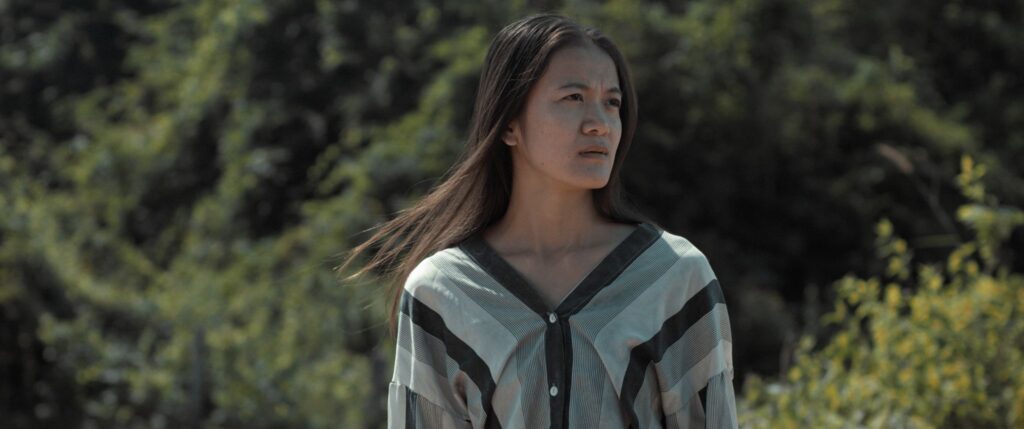Mattie Do delivers a new haunting vision that meditates on letting go and the unending march of time in this horror drama.
Director Mattie Do, Laos’ first and only woman director, has made an incredibly good-looking film, and against all odds, has made what I feel is going to be one of my favorite horror films of 2022. I say “against all odds” because I’m candidly not a fan of most time travel films. They often get too lost in their own cleverness and convoluted logic. But aesthetically and narratively, she and writer Christopher Larsen make it work.
I wouldn’t classify this as sci-fi despite many labeling it as one. I see it as a horror drama set in a not-so-distant future. Its frightening visuals and foreboding score confirm that, as do the themes and story, and that’s not even mentioning the thoroughly disturbing ending. The film keeps you in the headspace of a chilling ghost story while utilizing the futuristic elements to great effect. And despite all that this film finds itself juggling, it doesn’t waste time with an exposition of overcomplicated time travel rules, letting viewers unpack it all slowly through quiet, minimalist dialogue.
We follow a story torn between the past and the future as much as it’s torn between life and death, observing a hermit medium who can time travel by way of a young woman’s spirit that haunts him. Fans of Do’s last film about a medium speaking with ghosts, Dearest Sister, will note that this feels like a very fitting spiritual successor to Do’s previous work: The Long Walk also uses the supernatural to tackle deep social and cultural issues. Fans of Dearest will also recognize a returning collaborator in Vilouna Phetmany, who plays grieving daughter Lina in this film.
I can’t overstate how wonderful it is to get a look at Laos cinematically. The Long Walk is the first Laotian film to screen theatrically in the US, and as far as firsts go, it’s an impeccable choice since it looks gorgeous. The film is set in the Vientiane Province of Laos, and the cinematography benefits greatly from being shot on location. The countryside is peaceful but more haunting than enchanting. It carries this beauty without being idyllic, its verdant without the greenery being so colorfully lush. It fits the film well because this environment evokes the same feeling of looking back through an album of warm-hued photographs that have seemingly lost their sheen and grown a painful nostalgia. All the lighting feels so natural, and the staging and blocking of many of the shots are expertly handled. Do can evoke a sense of intimacy in some places and a sense of complete isolation in others. And the latter for me is where that cameraworks the best because at its rich thematic core, this is a film about isolation.
Yannawoutthi Chanthalungsy plays our main character, the unnamed Old Man whose been given a heavy burden of being able to commune with the dead. Like his father before him, he is a man without a world, let alone a country, alone and scrounging for scraps to feed himself as he fights against the tide of technological advance and growing industrialization. Do wants you to digest the dwindling pressure put on a small, rural village in decline, and she succeeds on that front in spades.
Discovering his ghostly companion’s ability to time travel, he goes back to try and save his mother by enlisting his younger self’s aid. Just as expected, everything goes wrong. Chanthalungsy’s interactions with the altered world he returns to convey that disorientation of moving between timelines, and you can almost see his heartbreak when he realizes how he has retroactively changed his relationships with others in the present. He and Phetmany work well off each other, portraying the relationship between the Old Man and his adoptive “niece” Lina as it evolves and eventually sours.
My technical notes are the main place where I find myself disagreeing with the film. Editing-wise, the film has issues with quick shot-reverse-shots in some scenes that feel unnecessary. Despite being a slow-burn thriller, the film could use a trim in the runtime as it comes in at a hefty two hours. While I appreciate that it takes the time to build up the atmosphere before bringing it all crashing down with that sorrowful climax (and it is sorrowful, believe you me), it stays just a hair too long for me.
Nonetheless, I’m still extremely glad I watched this. The Long Walk is unapologetically a cerebral film. While it takes a little bit of work on the viewer’s end, it’s a cut above other time travel films with lots of gorgeous cinematography on display. This is on my shortlist for horror I’ll be rewatching this year, so don’t be surprised if it makes my top 5 list this time next year.
RATING: 4/5
The Long Walk releases on streaming and VOD this March 1st.
